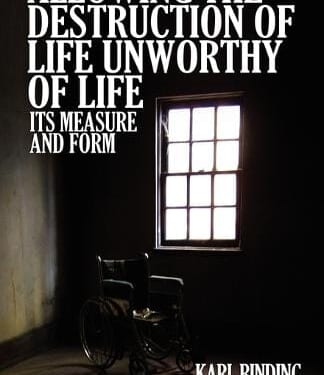Authors: Karl Binding & Alfred Hoche
Publisher: Suzeteo Enterprises
120 pages
Purchase from: Awesome Books (£10.54)
The assisted suicide bill reflects the moral chaos in the UK. Advocates claim that compassion means helping patients to take their lives. Dr Cicely Saunders, the pioneer of palliative medicine, was a devout Christian. Her research and many publications have blessed thousands of patients.
This book influenced the behaviour and self-delusion of the Nazis. Newly translated by Dr Cristina Modak, the 1920 arguments by professors of law (Binding) and medicine (Hoche) are within the mainstream of today’s ‘ethical’ thought. Hoche claimed ‘the most vivid sense of responsibility and the deepest love of mankind’ as motivation.
Binding and Hoche attack Christian belief and support economic reasons for ending the lives of others. Chronic sufferers from mental disease are compared intellectually to those ‘at the very bottom of the animal chain’. People who were brain-damaged, intellectually disabled, or psychiatrically ill are dubbed human ballast and empty human husks. Their destruction is not only called tolerable but downright humane.
In his introduction, Dr Anthony Horvath notes as dangerous:
- Deference to ‘experts’, including deference by ‘experts’ to other ‘experts’.
- Allowing ethical considerations regarding life and death to be linked to the interests of the ‘social organism’ (i.e. the state).
- Believing there is one set of moral principles for the ‘individual’ and another set for the ‘social organism’ (i.e. the state).
- Asserting that certain ethical considerations, behaviours, and attitudes flow directly from scientific data. (You cannot get an ‘ought’ from an ‘is’.)
- Behaving as though ideas – even grotesque, inhuman ideas – can be carefully considered for their relative merits as though they have no consequences or implications.
- Utilitarianism, especially when applied to a large group of people simultaneously by a small group of people, usually ‘experts’.
I strongly recommend you reading and sharing this important book, perhaps with legislators.
Dr Nigel Jones
Newcastle-upon-Tyne

















